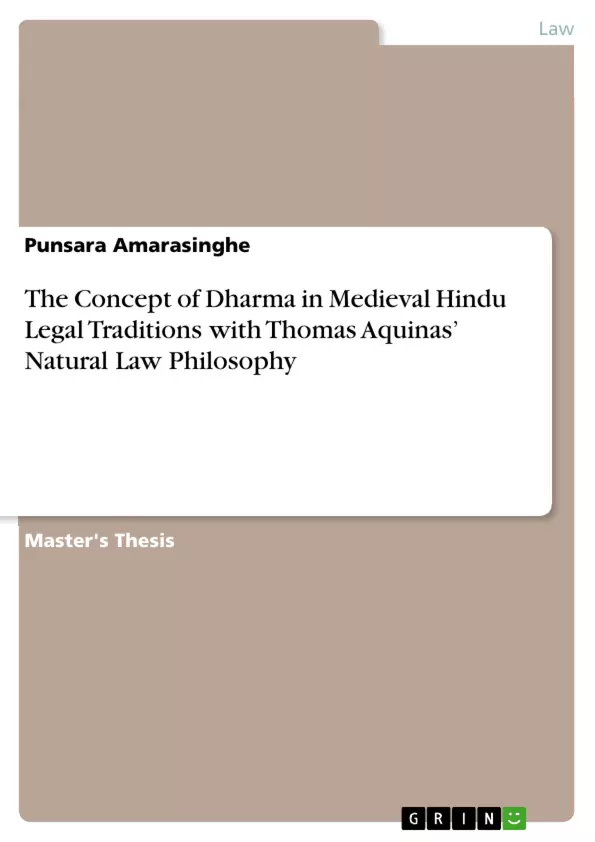This study intends to be a comparative analysis between two legal tradition which grew up in two different civilizations. The concept of Dharma in Medieval Hindu legal philosophy and Thomas Aquinas’ Natural Law theory have been taken into the
comparison in this research as two great legal traditions which grew in the same period of middle age. This research has examined the salient features of natural law ascribed by concept of Dharma in medieval Hindu jurisprudence and how natural
law was perceived by Aquinas in his legal philosophy which was aptly described in his master work “ Summa Theologiae”. Apart from mere analyzing facts this study further examines the affinities that existed between concept of Dharma and Aquinas’ theory of Natural Law.
Inhaltsverzeichnis (Table of Contents)
- Introduction
- Chapter 1: The Concept of Dharma in Hindu Legal Traditions
- The Concept of Dharma in Ancient India
- The Development of Dharma in Medieval Hindu Legal Traditions
- The Concept of Dharma in the Smriti Literature
- The Concept of Dharma in the Commentaries on the Smriti Literature
- Chapter 2: The Natural Law Philosophy of Thomas Aquinas
- The Concept of Natural Law in Aquinas' Philosophy
- The Relationship between Natural Law and Divine Law
- The Role of Reason in Aquinas' Natural Law Theory
- The Eternal Law
- The Natural Law
- The Human Law
- The Divine Law
- Chapter 3: A Comparative Analysis of Dharma and Natural Law
- Similarities between Dharma and Natural Law
- Differences between Dharma and Natural Law
- Chapter 4: The Relevance of Dharma in the Contemporary World
- The Role of Dharma in Modern Society
- The Challenges to Dharma in the Modern World
- The Future of Dharma
Zielsetzung und Themenschwerpunkte (Objectives and Key Themes)
This dissertation aims to provide a comprehensive analysis of the concept of Dharma in medieval Hindu legal traditions and to compare it with the natural law philosophy of Thomas Aquinas. By examining the similarities and differences between these two legal systems, the dissertation aims to shed light on the enduring relevance of Dharma in the contemporary world.
- The concept of Dharma in medieval Hindu legal traditions
- The natural law philosophy of Thomas Aquinas
- A comparative analysis of Dharma and natural law
- The relevance of Dharma in the contemporary world
- The enduring influence of Dharma on legal systems and societal values
Zusammenfassung der Kapitel (Chapter Summaries)
The first chapter delves into the concept of Dharma in Hindu legal traditions, tracing its origins in ancient India and its development in medieval times. It examines the role of Dharma in the Smriti literature and the commentaries that followed. The second chapter provides an overview of Thomas Aquinas' natural law philosophy, focusing on the concept of natural law, its relationship to divine law, and the role of reason in Aquinas' theory. Chapter three undertakes a comparative analysis of Dharma and natural law, highlighting their similarities and differences. This chapter explores the shared principles of morality and justice that both systems embrace, while also acknowledging their distinctive characteristics.
Schlüsselwörter (Keywords)
The primary keywords and concepts explored in this dissertation include Dharma, Hindu legal traditions, natural law, Thomas Aquinas, comparative law, moral philosophy, justice, and societal values. These terms are fundamental to understanding the historical evolution and contemporary relevance of Dharma in both the Indian context and within a broader global framework.
Frequently Asked Questions
What is the concept of Dharma in Hindu legal traditions?
Dharma is a central concept in Hindu philosophy encompassing duty, law, morality, and justice. In legal traditions, it defines the righteous path and social order as prescribed in ancient texts like the Smritis.
How does Thomas Aquinas define Natural Law?
Thomas Aquinas perceived Natural Law as a participation in the Eternal Law through human reason. It provides a set of moral principles that guide human conduct toward the common good, as detailed in his work "Summa Theologiae."
What are the similarities between Dharma and Natural Law?
Both traditions emphasize a universal moral order that transcends human-made laws. They share principles of justice, morality, and the idea that laws should be rooted in a higher cosmic or divine reality.
What role does human reason play in Aquinas' philosophy?
Reason is fundamental in Aquinas' theory; it is the tool through which humans discern the principles of Natural Law and apply them to specific human laws and actions.
Is the concept of Dharma relevant in the modern world?
Yes, Dharma continues to influence modern legal systems and societal values in India and beyond, providing a framework for ethical living and social responsibility in a globalized context.
What are the Smritis in relation to Dharma?
The Smritis are a category of Hindu sacred texts that elaborate on the codes of conduct and legal principles (Dharma) developed during the medieval period of Hindu jurisprudence.
- Quote paper
- Punsara Amarasinghe (Author), 2017, The Concept of Dharma in Medieval Hindu Legal Traditions with Thomas Aquinas’ Natural Law Philosophy, Munich, GRIN Verlag, https://www.grin.com/document/375863



